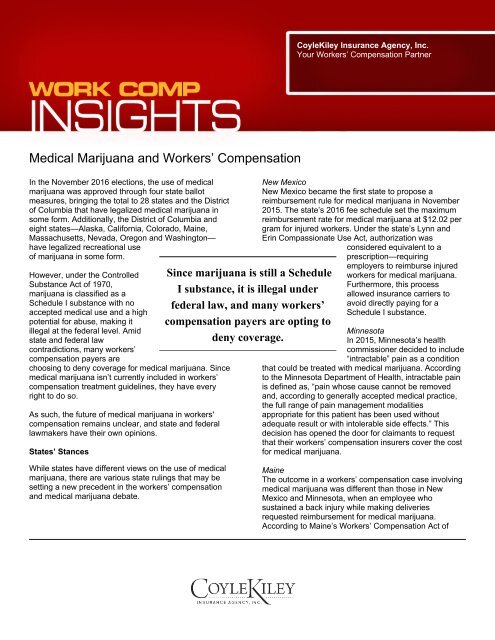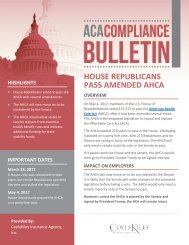Work Comp Insights - Medical Marijuana and Work Comp
Work Comp Insights - Medical Marijuana and Work Comp
Work Comp Insights - Medical Marijuana and Work Comp
Create successful ePaper yourself
Turn your PDF publications into a flip-book with our unique Google optimized e-Paper software.
CoyleKiley Insurance Agency, Inc.<br />
Your <strong>Work</strong>ers’ <strong>Comp</strong>ensation Partner<br />
<strong>Medical</strong> <strong>Marijuana</strong> <strong>and</strong> <strong>Work</strong>ers’ <strong>Comp</strong>ensation<br />
In the November 2016 elections, the use of medical<br />
marijuana was approved through four state ballot<br />
measures, bringing the total to 28 states <strong>and</strong> the District<br />
of Columbia that have legalized medical marijuana in<br />
some form. Additionally, the District of Columbia <strong>and</strong><br />
eight states—Alaska, California, Colorado, Maine,<br />
Massachusetts, Nevada, Oregon <strong>and</strong> Washington—<br />
have legalized recreational use<br />
of marijuana in some form.<br />
However, under the Controlled<br />
Substance Act of 1970,<br />
marijuana is classified as a<br />
Schedule I substance with no<br />
accepted medical use <strong>and</strong> a high<br />
potential for abuse, making it<br />
illegal at the federal level. Amid<br />
state <strong>and</strong> federal law<br />
contradictions, many workers’<br />
compensation payers are<br />
choosing to deny coverage for medical marijuana. Since<br />
medical marijuana isn’t currently included in workers’<br />
compensation treatment guidelines, they have every<br />
right to do so.<br />
As such, the future of medical marijuana in workers'<br />
compensation remains unclear, <strong>and</strong> state <strong>and</strong> federal<br />
lawmakers have their own opinions.<br />
States’ Stances<br />
Since marijuana is still a Schedule<br />
I substance, it is illegal under<br />
federal law, <strong>and</strong> many workers’<br />
compensation payers are opting to<br />
deny coverage.<br />
New Mexico<br />
New Mexico became the first state to propose a<br />
reimbursement rule for medical marijuana in November<br />
2015. The state’s 2016 fee schedule set the maximum<br />
reimbursement rate for medical marijuana at $12.02 per<br />
gram for injured workers. Under the state’s Lynn <strong>and</strong><br />
Erin <strong>Comp</strong>assionate Use Act, authorization was<br />
considered equivalent to a<br />
prescription—requiring<br />
employers to reimburse injured<br />
workers for medical marijuana.<br />
Furthermore, this process<br />
allowed insurance carriers to<br />
avoid directly paying for a<br />
Schedule I substance.<br />
Minnesota<br />
In 2015, Minnesota’s health<br />
commissioner decided to include<br />
“intractable” pain as a condition<br />
that could be treated with medical marijuana. According<br />
to the Minnesota Department of Health, intractable pain<br />
is defined as, “pain whose cause cannot be removed<br />
<strong>and</strong>, according to generally accepted medical practice,<br />
the full range of pain management modalities<br />
appropriate for this patient has been used without<br />
adequate result or with intolerable side effects.” This<br />
decision has opened the door for claimants to request<br />
that their workers’ compensation insurers cover the cost<br />
for medical marijuana.<br />
While states have different views on the use of medical<br />
marijuana, there are various state rulings that may be<br />
setting a new precedent in the workers’ compensation<br />
<strong>and</strong> medical marijuana debate.<br />
Maine<br />
The outcome in a workers’ compensation case involving<br />
medical marijuana was different than those in New<br />
Mexico <strong>and</strong> Minnesota, when an employee who<br />
sustained a back injury while making deliveries<br />
requested reimbursement for medical marijuana.<br />
According to Maine’s <strong>Work</strong>ers’ <strong>Comp</strong>ensation Act of
1992 (MWCA), “an injured worker is entitled to<br />
reasonable <strong>and</strong> proper medical, surgical, <strong>and</strong> hospital<br />
services, nursing, medicines, <strong>and</strong> mechanical <strong>and</strong><br />
surgical aids, as needed, paid for by the employer.”<br />
However, the employer argued that medical marijuanarelated<br />
services should not be covered under the<br />
MWCA, <strong>and</strong> that by covering such services, the<br />
employer would be in violation of federal law <strong>and</strong> subject<br />
to the risks of prosecution. In support of its argument,<br />
the employer also cited Maine’s medical marijuana<br />
statute, which states that it may not be construed to<br />
require a government medical assistance program or<br />
private health insurer to reimburse an individual for costs<br />
associated with the medical use of marijuana. The<br />
employer won the case.<br />
Other states, including Arizona <strong>and</strong> Montana, are in<br />
agreement with Maine <strong>and</strong> have taken the position that a<br />
workers’ compensation insurance carrier cannot be<br />
compelled to pay for medical marijuana because the<br />
possession <strong>and</strong> use of marijuana is still illegal under<br />
federal law.<br />
Federal Opinion<br />
<strong>Work</strong>ers’ compensation payers rely on evidence-based<br />
guidelines when making treatment decisions. Since<br />
medical marijuana is considered a Schedule I substance<br />
<strong>and</strong> is not included any workers’ compensation<br />
treatment guidelines, many payers are opting to deny<br />
coverage.<br />
Benefits of Covering <strong>Medical</strong> <strong>Marijuana</strong><br />
There is significant interest in using medical marijuana<br />
as an alternative to opiates for the management of<br />
chronic pain. Furthermore, alternative treatments may<br />
pave the way for medical marijuana, as meditation,<br />
exercise, mindfulness, yoga <strong>and</strong> cognitive behavioral<br />
therapy have proven successful in eliminating opioid<br />
use. However, insurers have historically been more likely<br />
to pay for opioids than alternative treatments.<br />
Drawbacks of Covering <strong>Medical</strong> <strong>Marijuana</strong><br />
In states that have legalized medical or recreational<br />
marijuana, workplace safety is a concern. It is the<br />
employer’s responsibility to foster an environment devoid<br />
of harmful hazards. If a company employs a medical<br />
marijuana user, this person might experience side<br />
effects that could lead to a workplace injury.<br />
Furthermore, drug-free workplace policies could be<br />
affected since marijuana continues to be categorized as<br />
a Schedule I substance. For example, although an<br />
employee may be authorized to use medical marijuana,<br />
he or she could still be terminated if found positive for<br />
marijuana in a r<strong>and</strong>om drug test.<br />
Federal Outlook<br />
It’s too early to anticipate President Donald Trump’s<br />
official policies with regards to medical marijuana.<br />
However, on the campaign trail, he said he was in favor<br />
of rescheduling marijuana as a Schedule II substance,<br />
which is in contrast to the Obama administration’s<br />
stance. In 2016, former President Barack Obama<br />
claimed that more research was needed into the drug’s<br />
possible medical benefits.<br />
New legislation <strong>and</strong> court decisions are continuing to<br />
develop, which will affect workers' compensation<br />
treatment decisions. For example, on Aug. 29, 2013, the<br />
Department of Justice published a memor<strong>and</strong>um<br />
authored by former Deputy Attorney General James<br />
Cole, outlining a new set of priorities for federal<br />
prosecutors operating in states which had legalized the<br />
use of marijuana. The "Cole memo" encouraged law<br />
enforcement agencies to focus on the most critical<br />
federal priorities, such as preventing the distribution of<br />
marijuana to minors. By doing so, the federal<br />
government is taking a more h<strong>and</strong>s-off approach in<br />
jurisdictions that have enacted laws legalizing marijuana.<br />
Also protecting the marijuana industry is the<br />
Rohrabacher-Farr amendment, which prohibits the<br />
federal government from spending money to target<br />
medical marijuana businesses. However, the federal<br />
government could still go after small businesses that<br />
don't have the resources to fight. And if this amendment<br />
isn’t renewed by Congress annually, the protection will<br />
disappear, <strong>and</strong> the industry could be set back for years.<br />
Until the discrepancy between state <strong>and</strong> federal law is<br />
resolved—particularly in regard to drug-free workplace<br />
policies—CoyleKiley Insurance Agency, Inc. will<br />
continue to monitor the l<strong>and</strong>scape for new developments<br />
that could have ongoing ramifications for the industry<br />
<strong>and</strong> could forecast marijuana reclassification.<br />
This <strong>Work</strong> <strong>Comp</strong> <strong>Insights</strong> is not intended to be exhaustive nor should any discussion or opinions be construed as legal advice. Readers should contact<br />
legal counsel or an insurance professional for appropriate advice. © 2017 Zywave, Inc. All rights reserved.





